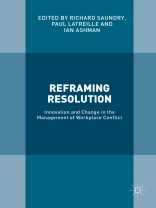Reframing Resolution provides an original, accessible and critical point of reference for students, practitioners and scholars interested in the management of workplace conflict. Drawing on contemporary empirical evidence from the UK, USA, Ireland and Australia, the book explores the front-line challenges facing organizations and individuals in addressing and responding to conflict. In particular, it examines the extent to which conflict management is treated as a strategic issue and discusses the development of mediation and its impact on employment relations culture, the experiences of participants in mediation and the relationship between ADR and workplace justice. Crucially, the book also assesses key innovations in the management of workplace conflict, and discusses the future potential of more integrated and systemic approaches.
Tabella dei contenuti
Foreword (Sir Brendan Barber, Chair of the Advisory Conciliation and Arbitration Service)-.Introduction (Ian Ashman, Paul Latreille and Richard Saundy)-. Part One: Surveying the Terrain-. Conceptualising workplace conflict and conflict management (Richard Saundry)-. Exploring the nature and extent of workplace conflict (John Forth and Gill Dix)-. Workplace conflict: who, where, when and why? (Jonny Gifford, Matthew Gould, Paul Latreille and Peter Urwin)-. Social structure and conflict: a relational approach to the study of conflict and its management in organizations (Ariel C. Avgar, Eric J. Neuman and Won Joon Chung)-. Part Two: Managing Conflict on the Front-Line-. A crisis of confidence? Front-line managers and the complexities of conflict (Carol Jones and Richard Saundry)-. From representation gap to resolution gap- exploring the role of employee voice in conflict management (Gemma Wibberley and Richard Saundry)-. Downsizing- managing redundancy and restructuring (Ian Ashman)-. Part Three: Workplace Mediation and Alternative Dispute Resolution-. Experiencing mediation from the disputant’s perspective (Tony Bennett)-. Mediation, ADR and UK trade unions- the missing link? (Virginia Branney)-. Turning third-party intervention on its head: assisted bargaining and the prevention of workplace conflict in Ireland (William K. Roche)-. Reshaping the role of the tribunal as third party in Australian workplace conflict resolution (Bernadine Van Gramberg and Julian Teicher)-. Workplace mediation schemes: antagonism and articulation in the discursive process of organizational conflict and disputes (Louise Mc Ardle and Pete Thomas)-. Part Four: New Perspectives on Conflict Management-. The evolution of conflict management policies in US corporations: from reactive to strategic (David B. Lipsky, Ariel C. Avgar and J. Ryan Lamare)-. Transforming the culture of conflict management? Lessons from in-house mediation (Paul Latreille and Richard Saundry)-. HRM, organizational citizenship behaviour and conflict management: the case of non-union MNC subsidaries in Ireland (Liam Doherty and Paul Teague)-. Conclusion (Ian Ashman, Paul Latreille and Richard Saundry).-
Circa l’autore
Richard Saundry is Professor of HRM and Employment Relations at Plymouth University, UK. His research interests include the management of workplace conflict and employee representation and he has published articles in a wide range of leading journals. He is a member of the editorial board of Work, Employment and Society and a Research and Policy Associate at Acas.
Paul Latreille is Professor of Management and Associate Dean for Learning & Teaching at Sheffield University Management School, UK. His research in applied labour economics and employment relations focuses on workplace conflict, mediation/ADR and Employment Tribunals. He has published extensively for academic and policymaker/practitioner audiences, and has completed numerous externally-commissioned projects.
Ian Ashman is Director of the Institute for Research into Organisations, Work and Employment at the University of Central Lancashire, UK. He has researched and published widely onvarious related subjects including downsizing, conflict, engagement, leadership and ethics. He is interested in the application of existentialism to these and similar topics.












